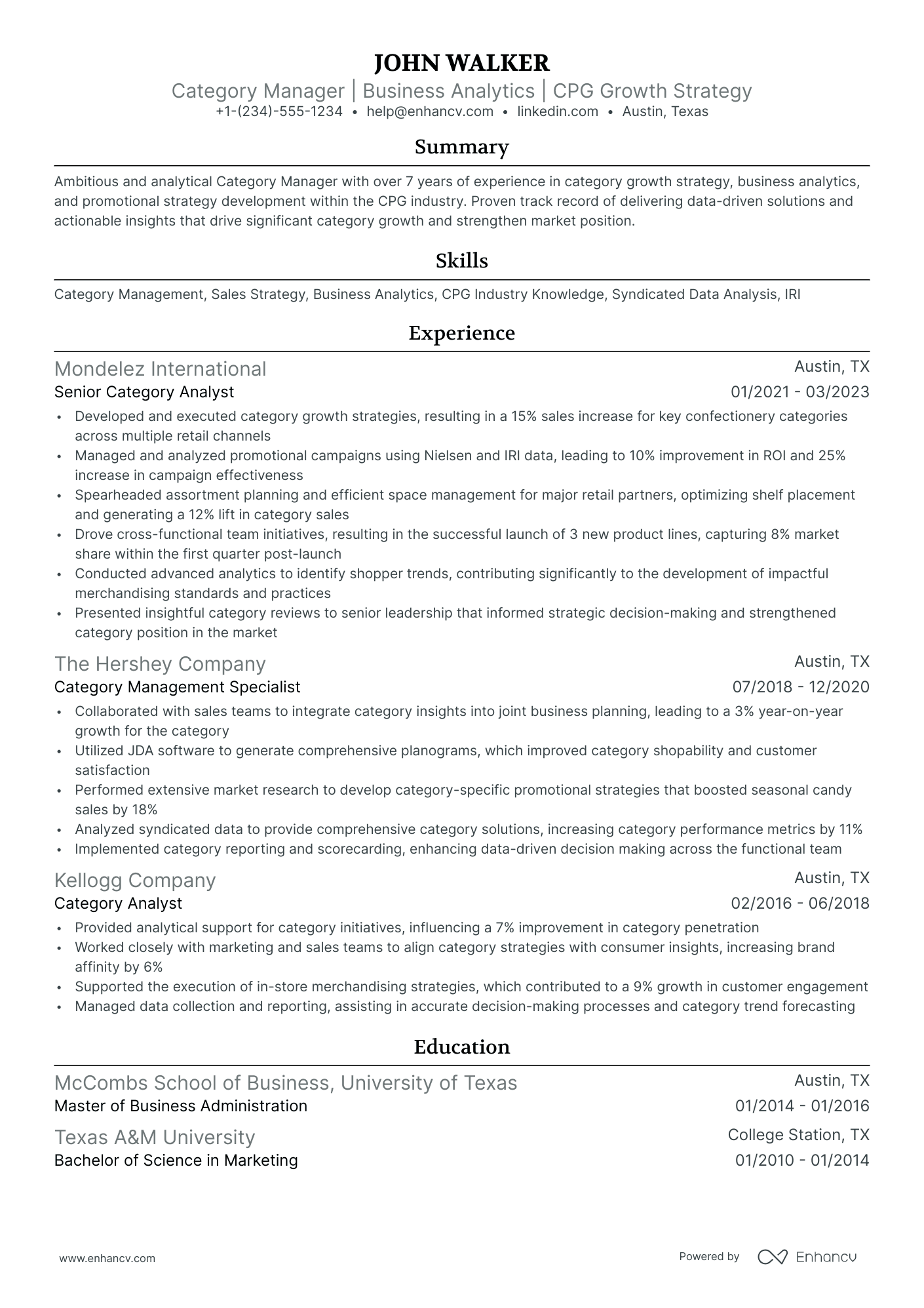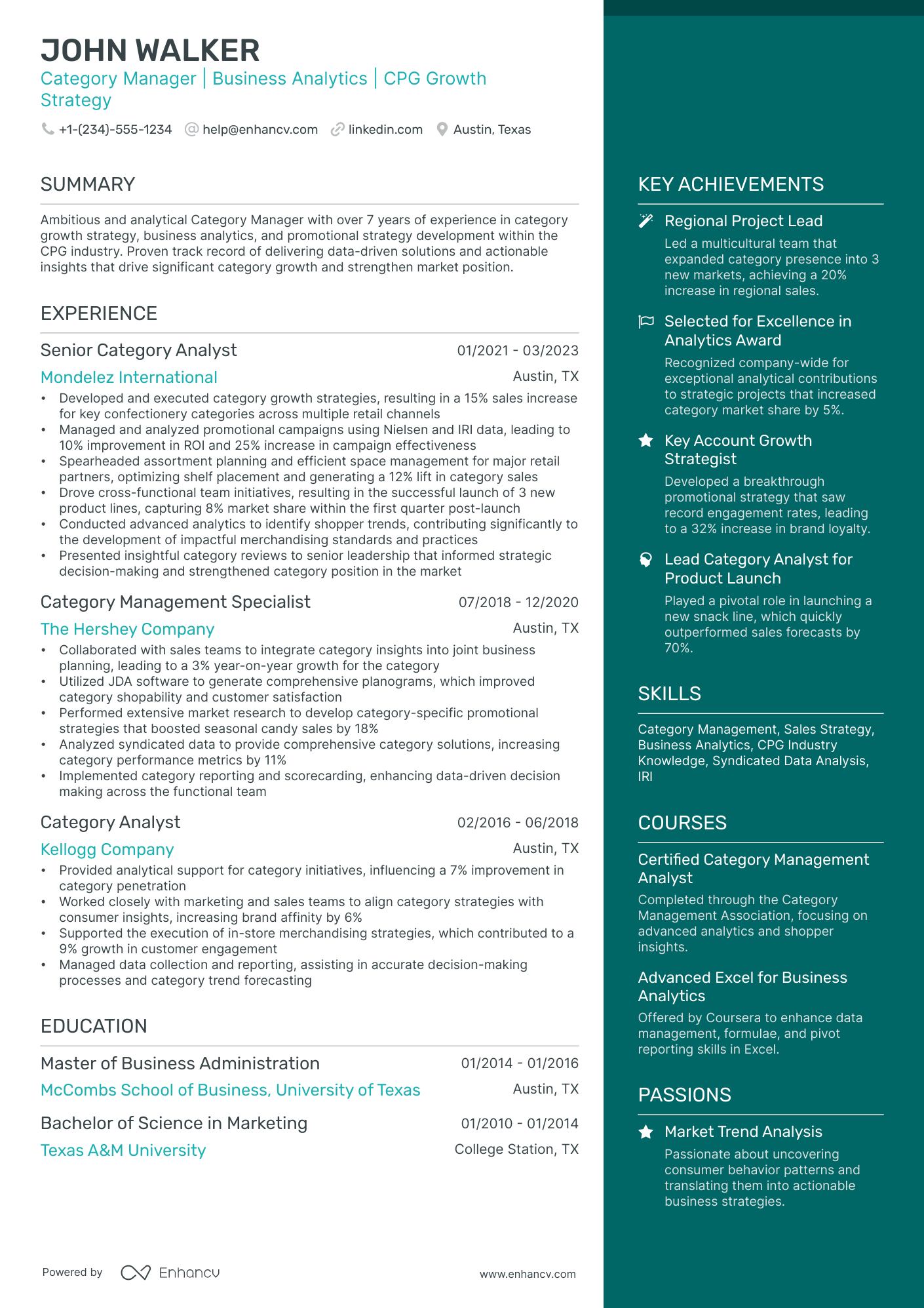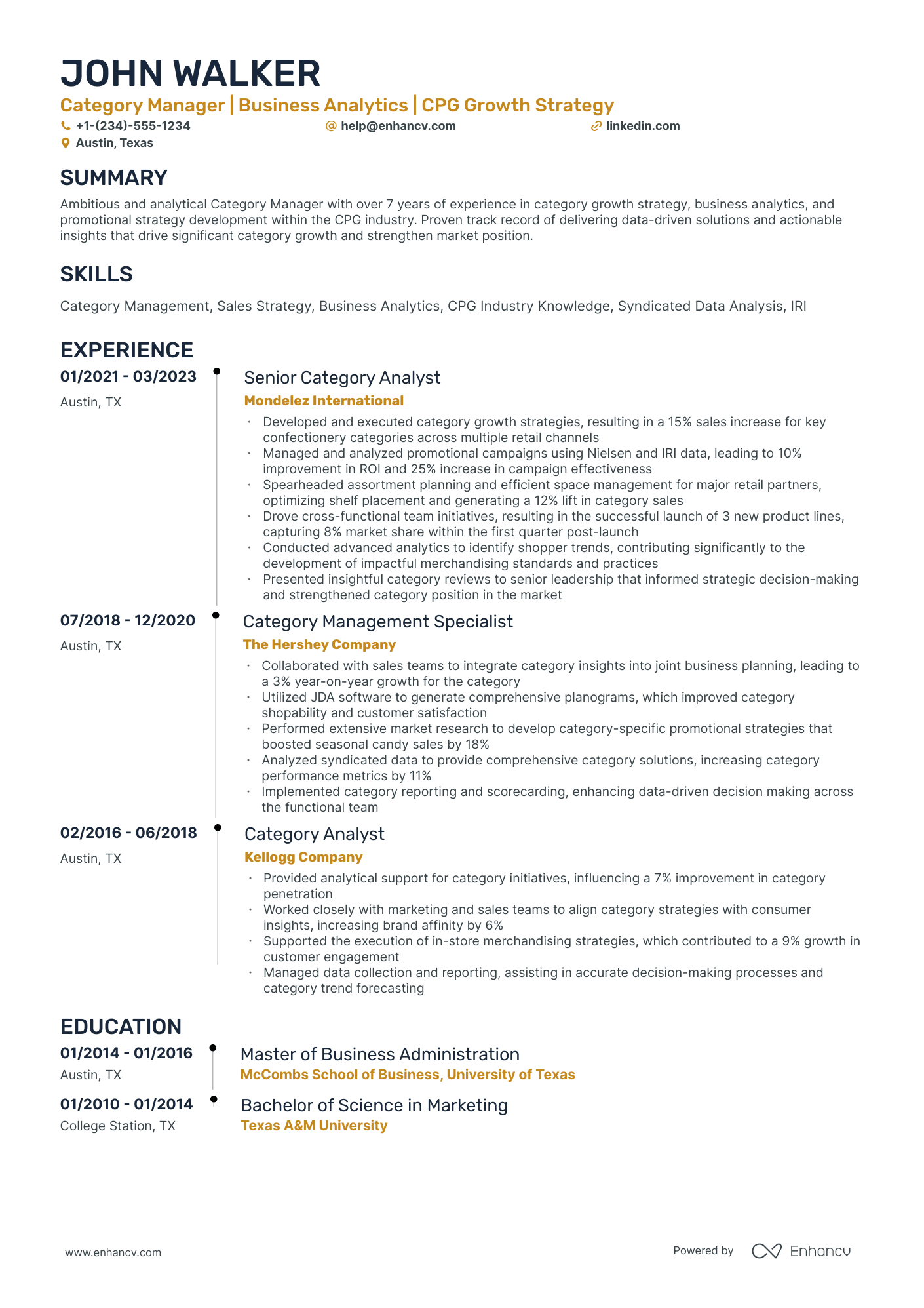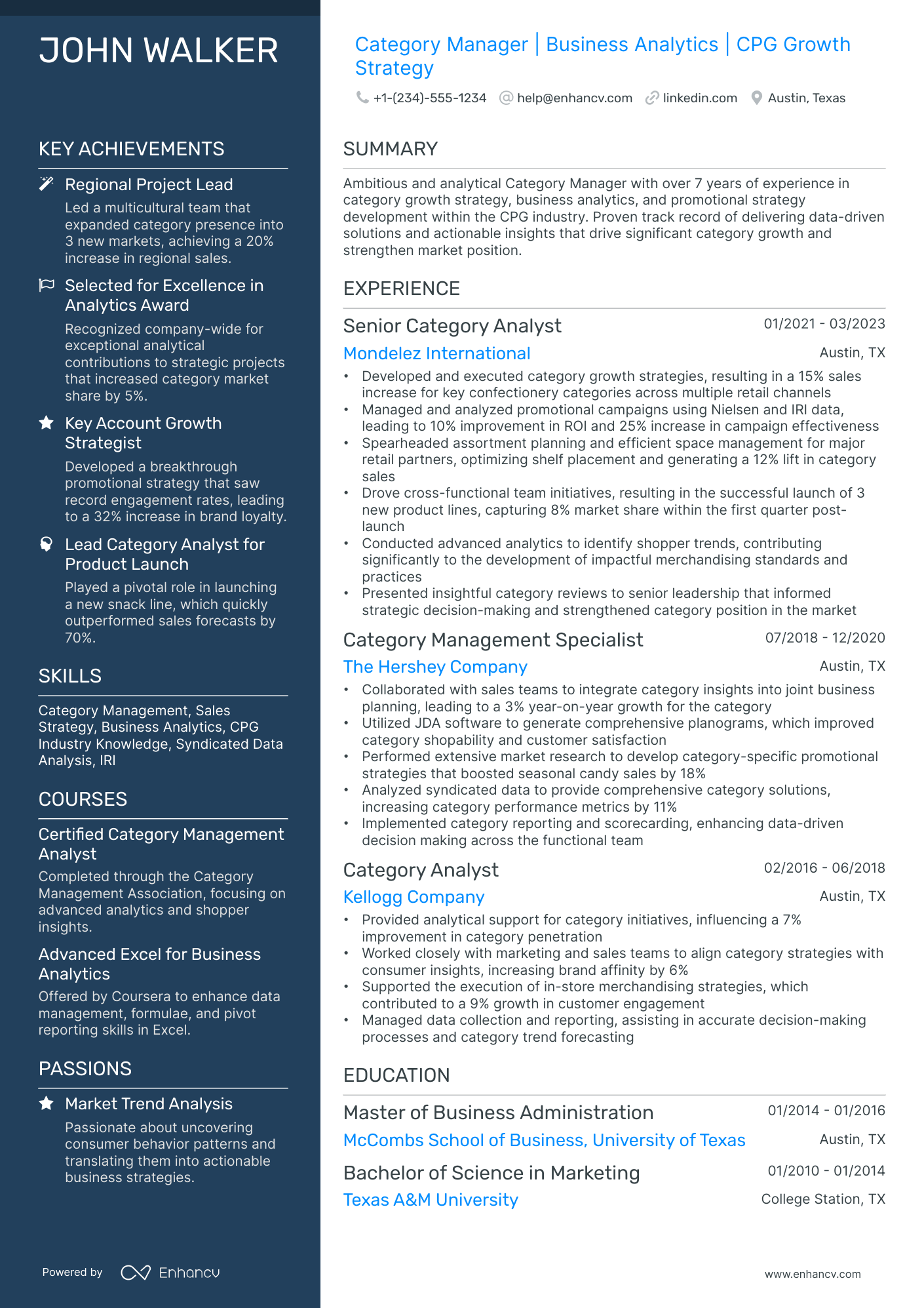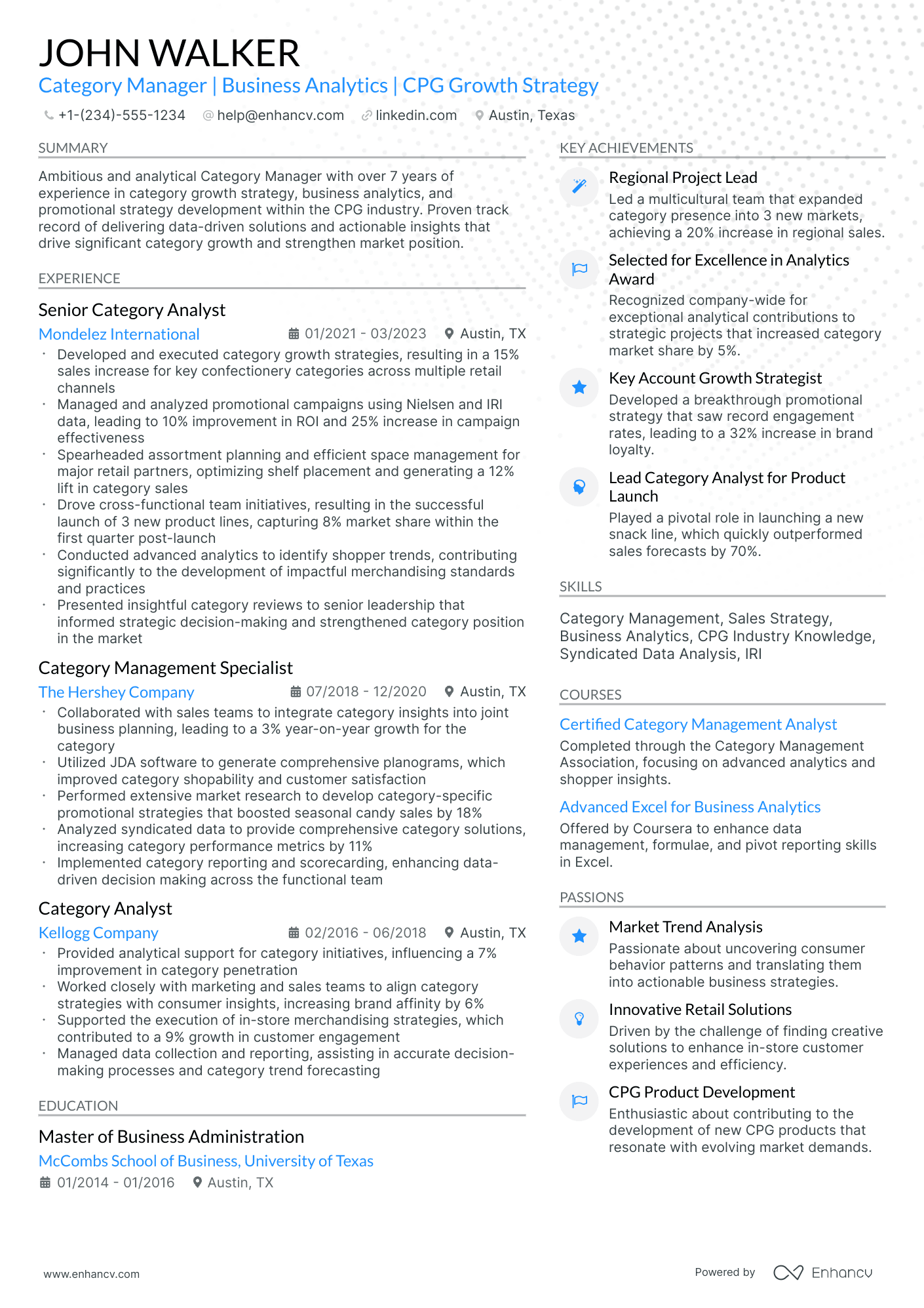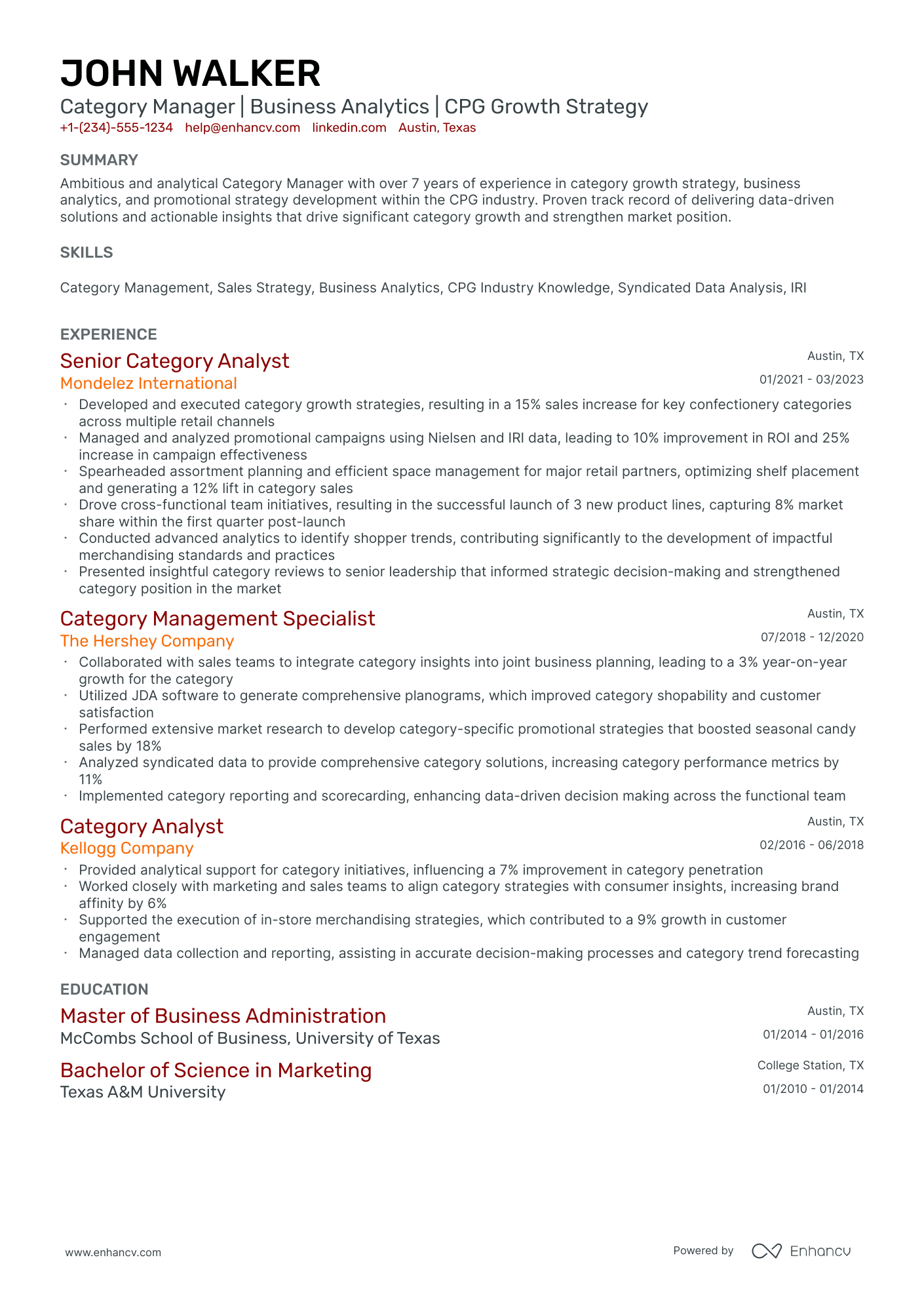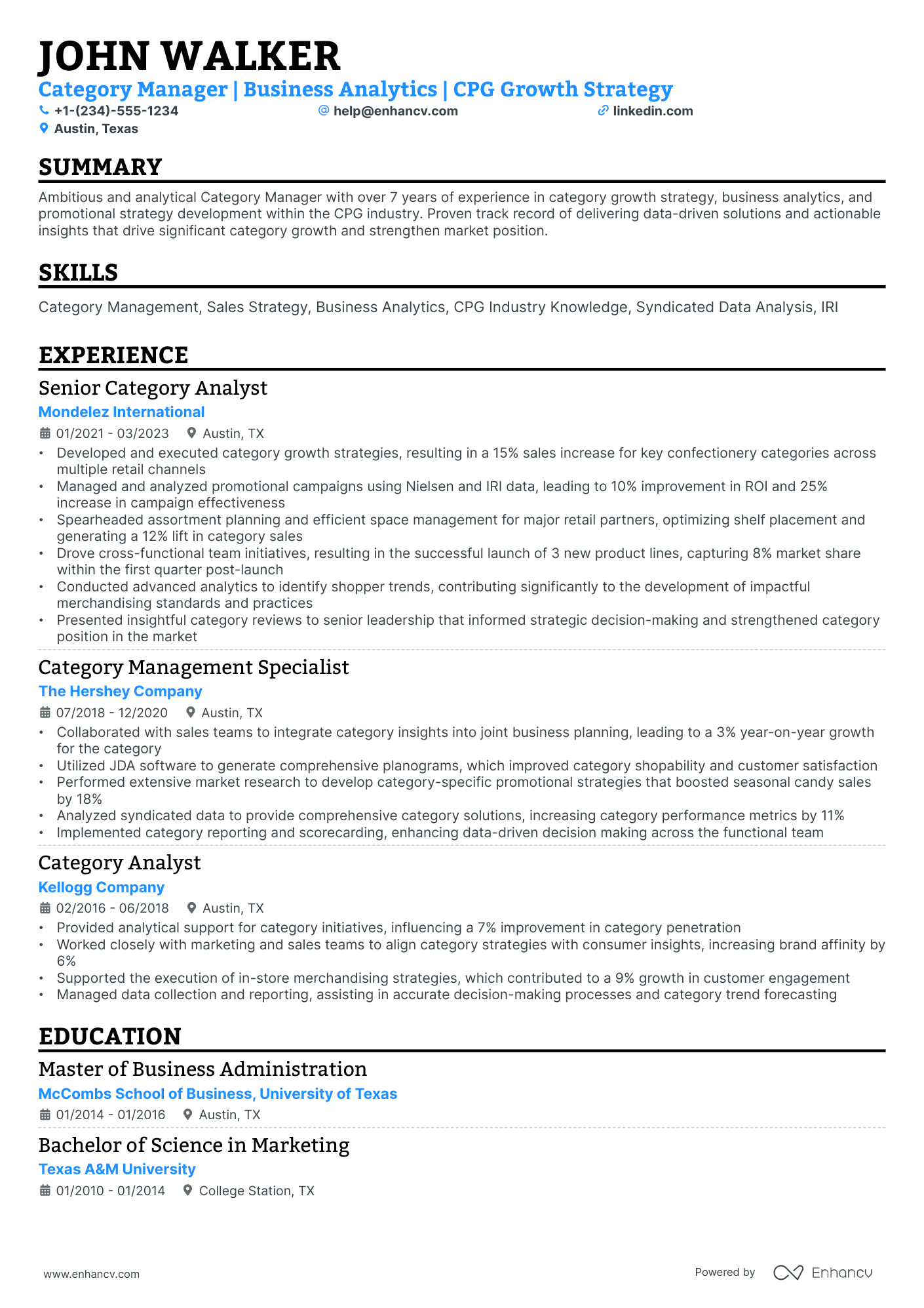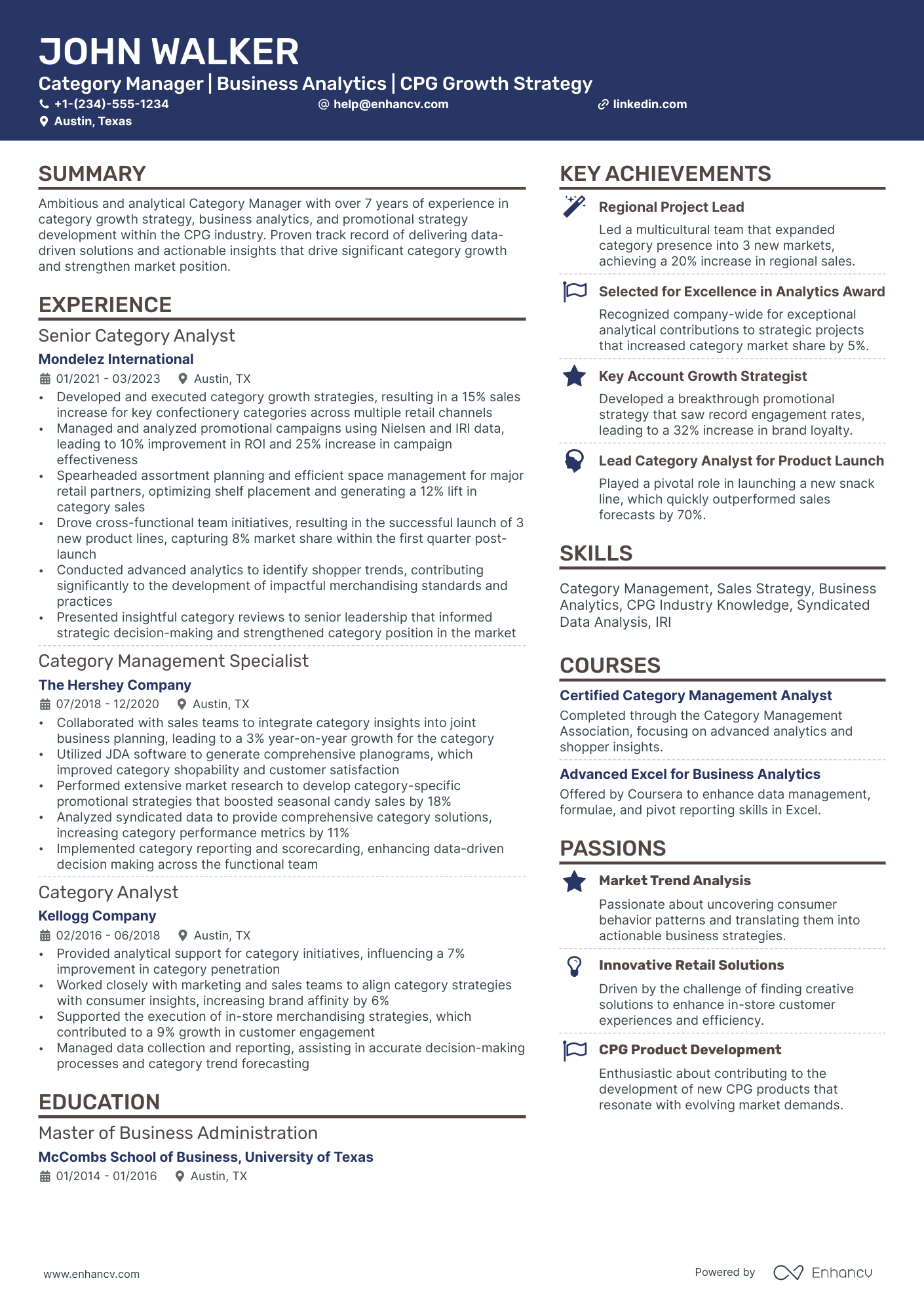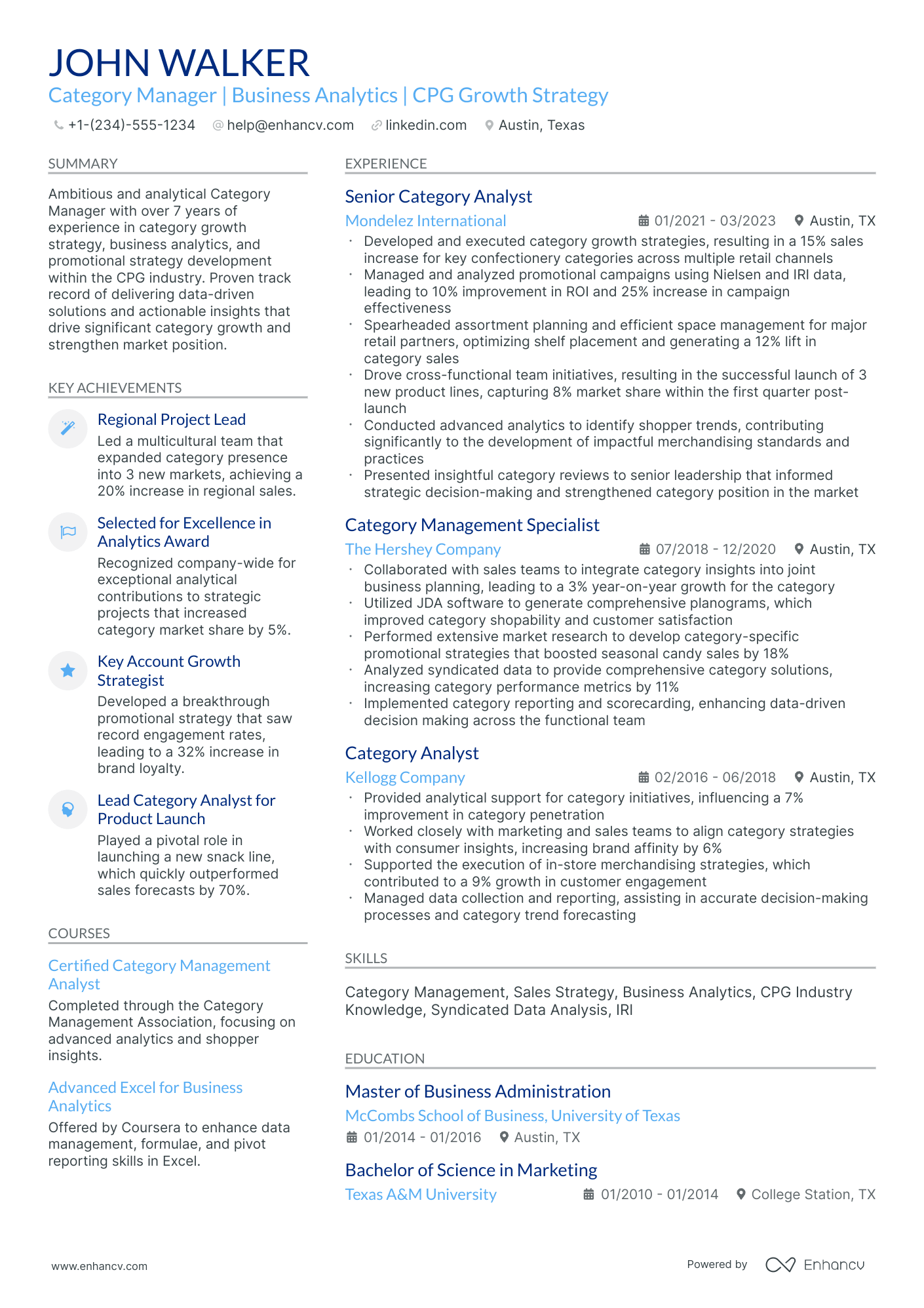As a category manager, articulating your unique ability to optimize assortments and enhance supplier negotiations can be a complex resume challenge to succinctly convey. Our guide is specifically tailored to help you strategically highlight your accomplishments and industry expertise, ensuring your capabilities are effectively showcased to potential employers.
- The most effective category manager resume samples, reflecting on experience and skills.
- +10 simple, yet impactful methods to tailor your category manager resume to the job advert.
- Using your professional achievements as the North Star to your unique value as a category manager candidate.
- 'No one cares about your education nowadays …' Let's prove this statement wrong with the best-kept industry secrets to your education and certifications.
If the category manager resume isn't the right one for you, take a look at other related guides we have:
- Service Delivery Manager Resume Example
- Business Director Resume Example
- Planning Manager Resume Example
- Floor Manager Resume Example
- Claims Manager Resume Example
- RPA Business Analyst Resume Example
- Resource Manager Resume Example
- SAP Business Analyst Resume Example
- Strategy Manager Resume Example
- Alliance Manager Resume Example
Creating the best category manager resume format: four simple steps
The most appropriate category manager resume format is defined by precision and a systematic approach. What is more, it should reflect upon how your application will be assessed by recruiters. That is why we've gathered four of the most vital elements to keep in mind when designing your resume:
- It's all about presenting how your experience or skills align with the job. Use the reverse-chronological resume format , if your expertise is relevant to the category manager role. Otherwise, select the functional skill-based resume format or the hybrid resume format to shift the focus to your skill set.
- Resume header - make sure you've filled out all relevant (and correct) information, like your contact details and link to your portfolio.
- Resume length - unless you've over a decade of applicable expertise in the field, stick with a one-page resume format. If you'd like to present more of your professional experience, go up to two pages.
- Resume file - submit your category manager resume in a PDF format to ensure all information stays in the same place.
Think about the market’s preferences – a Canadian resume, for instance, could have a different layout.
Upload & Check Your Resume
Drop your resume here or choose a file. PDF & DOCX only. Max 2MB file size.
PRO TIP
If the certificate you've obtained is especially vital for the industry or company, include it as part of your name within the resume headline.
The six in-demand sections for your category manager resume:
- Top one-third should be filled with a header, listing your contact details, and with a summary or objective, briefly highlighting your professional accolades
- Experience section, detailing how particular jobs have helped your professional growth
- Notable achievements that tie in your hard or soft skills with tangible outcomes
- Popular industry certificates to further highlight your technical knowledge or people capabilities
- Education to showcase your academic background in the field
What recruiters want to see on your resume:
- Proven track record of successful category management and development, with quantifiable results in sales growth, category expansion, and market share improvement.
- In-depth knowledge of category-specific market trends, customer needs, and product assortment optimization.
- Strong analytical skills with the ability to interpret complex data, perform category analysis, and provide actionable insights for strategic decision-making.
- Experience with vendor negotiation, supplier relationship management, and cost-saving strategies specific to category procurement.
- Demonstrated expertise in cross-functional collaboration, influencing internal teams such as marketing, supply chain, and sales to drive category initiatives.
Experts' advice on writing your category manager resume experience
While the excitement and motivation for writing your category manager resume was present in the first hour (or so), you now find yourself staring at the blank page.
The resume experience section is the one that allows you to make a memorable impression by matching job requirement with your past jobs and accomplishments.
To help you write this resume section, here are four mistakes you need to avoid:
- Listing every job you have had so far, including the irrelevant ones. Before that, consider each of your past roles based on relevancy to the role. It may be the case that the job you had 15 years ago may have taught you invaluable skills that are appropriate for the role;
- Including irrelevant work experience items. Those are past jobs that aren't linked with the role you're applying for (or so they seem). Consider how your past jobs will serve your professional presentation: will they be filling in a gap in your work history, or just taking up space?
- Focusing on responsibilities instead of accomplishments. Your category manager resume shouldn't just be telling recruiters what you did in the past - as it's most often the case that candidates have had similar responsibilities. But, rather, the experience section should showcase the success you've attained in each past role, thanks to your unique skill set;
- Consider listing just your professional experience. Any role you've had in the past - e.g. volunteering, internships, etc. - can make it into your category manager resume experience section. Make sure to include it alongside numbers and results.
Two more things you need to remember about your resume experience section.
The first are keywords. Or those specific job requirements that are crucial for the role . Ensure you've integrated them across your experience section to get sorted closer to the ideal candidate profile by the Applicant Tracker System (ATS).
The second are action verbs. Each of your experience bullets should start with a strong action verb, followed by your specific skill and your on the job achievements. Follow this formula to hint to recruiters what your unique value as a professional is.
Still with us? In the next section, we will show you how industry-leading professionals have avoided the four most common mistakes, while integrating keywords and action verbs in their experience section.
- Spearheaded the category strategy for personal care products, leading to a 25% increase in category sales over a 3-year period.
- Negotiated with over 50 suppliers to optimize costs while ensuring quality, achieving an average of 18% cost savings across key product lines.
- Implemented a data-driven approach for inventory management that reduced stockouts by 15% and decreased excess inventory by 20%.
- Managed a portfolio of over 200 SKUs, successfully launching 30 new products that contributed to a 12% growth in category revenue.
- Led a cross-functional team to develop an omni-channel promotion strategy, resulting in a 14% uplift in customer engagement across online and offline channels.
- Coordinated with marketing and sales to design and execute three category-specific campaigns annually, leading to significant brand awareness.
- Identified market trends and adapted category assortment accordingly, which captured a 10% increase in market share for home care products.
- Developed vendor performance scorecards that increased vendor compliance to 95%, enhancing product availability and customer satisfaction.
- Collaborated with the supply chain team on introducing just-in-time inventory practices, leading to a reduction in carrying costs by 22%.
- Conducted comprehensive market analysis to drive entry into a new health & wellness category, doubling the business segment's contribution to overall profits within two years.
- Cultivated relationships with suppliers to incorporate sustainable and eco-friendly products, enhancing brand reputation and consumer loyalty.
- Optimized product placement and promotional tactics by leveraging advanced analytics tools, leading to a 16% uplift in sales per square foot.
- Executed a category refresh for the electronics department, which resulted in a 30% increase in customer footfall and a 20% boost in sales year-over-year.
- Partnered with the e-commerce team to develop an online marketplace strategy, increasing online category sales by 40%.
- Fostered a culture of continuous improvement in category management processes, introducing agile methodologies that shortened product time-to-market by 25%.
- Orchestrated a customer-centric planogram redesign that improved the shopping experience and increased basket size by an average of $10 per transaction.
- Played a pivotal role in diversifying the beverage category, introducing 20+ organic and craft brands that captured a new customer segment.
- Utilized predictive analytics to forecast sales trends, accurately planning for seasonal peaks and minimizing out-of-stock scenarios.
- Led the digital transformation of category management, integrating machine learning tools for assortment optimization and delivering a 15% improvement in gross margin.
- Collaborated with IT to develop a supplier portal, streamlining communication and reducing the average time for issue resolution by 30%.
- Championed a supplier diversity initiative, increasing the number of minority-owned businesses represented in the category by 20%.
- Oversaw a critical cost-saving project, consolidating the number of suppliers by 10% without compromising on quality or delivery times.
- Introduced a competitive benchmarking framework, enabling more informed pricing strategies and improved margins by 8%.
- Organized quarterly supplier innovation days, enabling the discovery and launch of five industry-first products in a single fiscal year.
- Developed and executed a comprehensive plan to revitalize a declining food category, achieving a turnaround with a 12% increase in sales within the first year.
- Initiated a collaboration with data scientists to create advanced forecasting models that improved demand planning accuracy by 18%.
- Drove the adoption of a category-specific CSR plan, contributing to a 10% increase in positive brand mentions on social media platforms.
- Managed a major category restructuring project in line with changing consumer behavior, positioning the company as a market leader in healthy snacking options.
- Closely analyzed customer data to tailor product assortments across regional markets, resulting in an sales consistency and a 5% higher customer retention rate.
- Enhanced cross-departmental collaboration by setting up monthly category review meetings, which led to a 10% faster response to market changes.
The following content includes information from "O*NET OnLine" by the U.S. Department of Labor, Employment and Training Administration (USDOL/ETA). Used under the CC BY 4.0 license. The data represents the top responsibilities present on the task lists for category manager professionals.
Top Responsibilities for Category Manager:
- Identify, develop, or evaluate marketing strategy, based on knowledge of establishment objectives, market characteristics, and cost and markup factors.
- Formulate, direct, or coordinate marketing activities or policies to promote products or services, working with advertising or promotion managers.
- Evaluate the financial aspects of product development, such as budgets, expenditures, research and development appropriations, or return-on-investment and profit-loss projections.
- Develop pricing strategies, balancing firm objectives and customer satisfaction.
- Compile lists describing product or service offerings.
- Direct the hiring, training, or performance evaluations of marketing or sales staff and oversee their daily activities.
- Consult with product development personnel on product specifications, such as design, color, or packaging.
- Use sales forecasting or strategic planning to ensure the sale and profitability of products, lines, or services, analyzing business developments and monitoring market trends.
- Negotiate contracts with vendors or distributors to manage product distribution, establishing distribution networks or developing distribution strategies.
- Coordinate or participate in promotional activities or trade shows, working with developers, advertisers, or production managers, to market products or services.
Quantifying impact on your resume
- Specify the percentage by which you increased sales or market share in your category to demonstrate revenue growth expertise.
- Mention the dollar amount of cost savings you achieved through effective vendor negotiation or inventory management.
- List the number of SKUs you managed or rationalized, which shows the scale of your responsibility and efficiency enhancement.
- Quantify the improvement in supply chain lead times due to your strategic planning abilities.
- Highlight the number of new products or product lines you successfully launched to emphasize innovation and market expansion.
- Detail the percentage growth in customer satisfaction scores under your category management to prove customer-centric achievements.
- Indicate the number of cross-functional teams you led or collaborated with to show leadership and teamwork prowess.
- Report on the rate of inventory turnover improvement to illustrate effective stock management.
Action verbs for your category manager resume
Four quick steps for candidates with no resume experience
Those with less or no relevant experience could also make a good impression on recruiters by:
- Taking the time to actually understand what matters most to the role and featuring this within key sections of their resume
- Investing resume space into defining what makes them a valuable candidate with transferrable skills and personality
- Using the resume objective to showcase their personal vision for growth within the company
- Heavily featuring their technical alignment with relevant certifications, education, and skills.
Remember that your resume is about aligning your profile to that of the ideal candidate.
The more prominently you can demonstrate how you answer job requirements, the more likely you'd be called in for an interview.
Recommended reads:
PRO TIP
Mention specific courses or projects that are pertinent to the job you're applying for.
Bringing your category manager hard skills and soft skills to the forefront of recruiters' attention
Hard skills are used to define the technological (and software) capacities you have in the industry. Technical skills are easily defined via your certification and expertise.
Soft skills have more to do with your at-work personality and how you prosper within new environments. People skills can be obtained thanks to your whole life experience and are thus a bit more difficult to define.
Why do recruiters care about both types of skills?
Hard skills have more to do with job alignment and the time your new potential employers would have to invest in training you.
Soft skills hint at how well you'd adapt to your new environment, company culture, and task organization.
Fine-tune your resume to reflect on your skills capacities and talents:
- Avoid listing basic requirements (e.g. "Excel"), instead substitute with the specifics of the technology (e.g. "Excel Macros").
- Feature your workplace values and ethics as soft skills to hint at what matters most to you in a new environment.
- Build a separate skills section for your language capabilities, only if it makes sense to the role you're applying for.
- The best way to balance category manager hard and soft skills is by building a strengths or achievements section, where you define your outcomes via both types of skills.
There are plenty of skills that could make the cut on your resume.
That's why we've compiled for you some of the most wanted skills by recruiters, so make sure to include the technologies and soft skills that make the most sense to you (and the company you're applying for):
Top skills for your category manager resume:
Category Management Software
Data Analysis Tools (e.g., Excel, Tableau)
Market Research Tools
ERP Systems (e.g., SAP, Oracle)
Inventory Management Software
Supplier Relationship Management Tools
Pricing Strategy Software
Sales Forecasting Tools
E-commerce Platforms
Project Management Tools (e.g., Asana, Trello)
Negotiation
Analytical Thinking
Communication
Strategic Planning
Problem Solving
Team Collaboration
Adaptability
Leadership
Decision Making
Time Management
Next, you will find information on the top technologies for category manager professonals from "O*NET OnLine" by the U.S. Department of Labor, Employment and Training Administration (USDOL/ETA). Used under the CC BY 4.0 license.
Top technologies for Category Manager’s resume:
- Airtable
- MySQL
- Oracle JavaServer Pages JSP
- Ruby on Rails
- TikTok
- YouTube
PRO TIP
The more time and effort you've put into obtaining the relevant certificate, the closer to the top it should be listed. This is especially important for more senior roles and if the company you're applying for is more forward-facing.
Listing your education and certifications on your category manager resume
Don't underestimate the importance of your resume education section . As it may hint at various skills (and experience) that are relevant to the job. When writing your education section:
- Include only higher education degrees with information about the institution and start/end dates
- If you're in the process of obtaining your degree, include your expected graduation date
- Consider leaving off degrees that aren't relevant to the job or industry
- Write a description of your education if it presents you with an opportunity to further showcase your achievements in a more research-focused environment
When describing your certifications on your resume, always consider their relevancy to the role. Use the same format to describe them as you would for your education. If you're wondering what the best certificates out there are for category manager roles, check out the list below.
The top 5 certifications for your category manager resume:
- Category Management Association (CMA) Certified Professional category manager (CPCM)
- Category Management Association (CMA) Certified Professional Strategic Advisor (CPSA)
- National Association for Retail Marketing Services (NARMS) Certified Retail Analyst (CRA)
- Institute for Supply Management (ISM) Certified Professional in Supply Management (CPSM)
- The Chartered Institute of Procurement & Supply (CIPS) Advanced Certificate in Procurement and Supply Operations
The content below includes information from "O*NET OnLine" by the U.S. Department of Labor, Employment and Training Administration (USDOL/ETA). Used under the CC BY 4.0 license. The data represents the top associations for category manager professionals.
Top US associations for a Category Manager professional
- American Association of Advertising Agencies
- American Marketing Association
- Association of Sales and Marketing Companies
- Business Marketing Association
- Hospitality Sales and Marketing Association International
PRO TIP
Bold the names of educational institutions and certifying bodies for emphasis.
Recommended reads:
Adding a summary or objective to your category manager resume
One of the most crucial elements of your professional presentation is your resume's top one-third. This most often includes:
- Either a resume summary - your career highlights at a glance. Select the summary if you have plenty of relevant experience (and achievements), you'd like recruiters to remember about your application.
- Or, a resume objective - to showcase your determination for growth. The perfect choice for candidates with less experience, who are looking to grow their career in the field.
If you want to go above and beyond with your category manager resume summary or resume objective, make sure to answer precisely why recruiters need to hire you. What is the additional value you'd provide to the company or organization? Now here are examples from real-life category manager professionals, whose resumes have helped them land their dream jobs:
Resume summaries for a category manager job
- With over 12 years of dedicated experience in retail category management for a Fortune 500 company, the candidate has a proven track record of driving category profitability through strategic assortment planning and vendor negotiations, leading to a 35% increase in category growth over three years.
- Transitioning from an impressive 10-year tenure as a digital marketing strategist, this candidate brings exceptional data analysis and consumer behavior insights to adeptly steer product category decisions, aiming to replicate past successes such as a 50% increase in online engagement through targeted campaign management.
- Seasoned procurement specialist with 15 years of experience, now seeking to leverage extensive supply chain knowledge and strategic vendor partnerships in a category management capacity to enhance product assortments and drive cost efficiencies, previously achieving a 20% reduction in expenses through negotiation excellence.
- Former sales executive with 8 years of experience wishes to transfer exceptional negotiation and relationship-building skills into category management, having successfully managed a portfolio of high-value accounts leading to a consistent 10% year-over-year sales increase.
- Eager to apply a fresh academic background in economics and passion for market trends as a springboard into category management, the candidate is intent on harnessing the potential of data analytics to optimize product choices and to help achieve sustainable sales growth for emerging business sectors.
- With a vibrant interest in consumer goods and a recent MBA graduate, the applicant is poised to bring energetic dedication and an avid learning aptitude to category management, while being committed to applying modern analytical tools and creative merchandising strategies to enrich customer experience and boost sales figures.
Optimize your resume summary and objective for ATS
Drop your resume here or choose a file.
PDF & DOCX only. Max 2MB file size.
Average salary info by state in the US for category manager professionals
Local salary info for Category Manager.” Source: My Next Move, National Center for O*NET Development. Accessed 10/15/2024
| State | Average Salary (in USD) |
|---|---|
| US National Average | $157,620 |
| California (CA) | $174,480 |
| Texas (TX) | $135,050 |
| Florida (FL) | $138,340 |
| New York (NY) | $173,290 |
| Pennsylvania (PA) | $131,890 |
| Illinois (IL) | $149,430 |
| Ohio (OH) | $132,000 |
| Georgia (GA) | $156,680 |
| North Carolina (NC) | $143,800 |
| Michigan (MI) | $134,200 |
Bonus sections for your category manager resume
Looking to show more personality on your category manager resume? Then consider including a couple of extra sections.
They'd benefit your application by highlighting your most prominent:
Key takeaways
- Ensure your category manager resume uses a simple, easy-to-read format that reflects upon your experience and aligns with the role;
- Be specific within the top one-third of your resume (header and summary or objective) to pinpoint what makes you the ideal candidate for the category manager role;
- Curate information that is tailored to the job by detailing skills, achievements, and actual outcomes of your efforts;
- List your certifications and technical capabilities to demonstrate your aptitude with specific software and technologies;
- The sections you decide on including on your category manager should pinpoint your professional expertise and personality.
